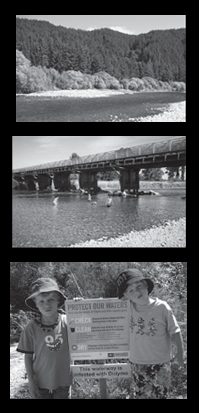Collaborative learning

Case study 5
Management is a distinctly human process. Social science in the ICM programme has developed and trialled tools and approaches that can be used by research groups, agency staff and other community leaders to support more effective multi-stakeholder processes for learning and decision-making.
What emerged across various projects is that collaboration and social learning are processes that continue over time and are not just tool- based one-off events. The aim must be to improve engagement as an ongoing quality of process. Social science research covered learning groups, the internationally recognised Travelling River art–science collaboration, mapping of social spaces, design of electronic discussion groups, Māori capacity building and more.
Researchers developed a framework to encourage the use of clear steps, and design of dialogue processes that support participation and self-help in natural resource management. The resulting ISKM (Integrated Systems for Knowledge Management) framework links knowledge management with collaboration and adaptive management approaches to natural resource management. More recently this approach has been taken out of the catchment context to learn, for example, about issues related to oil and gas in British Columbia, Canada, and understanding the links between land-use practices and livelihoods around Lake Victoria in Africa.
Watershed Talk, a community resilience project, explored how we can more effectively cultivate ideas and action for environmental stewardship at a catchment scale. Innovative techniques and purposeful design were shown to generate new ways to engage different worldviews. Often a set of practices or values underpin our wanting to leave the land in better shape; this project revealed what different local people care about and how everyone feels a sense of responsibility towards protecting the Motueka catchment. The Watershed Talk project distinguished how resilience approaches to problem solving differ from traditional approaches, for example of some RMA statutory processes. The book from Manaaki Whenua Press on this project documents techniques for cultivating ideas and community action for better stewardship of the environment.
Evaluation approaches that closely link institutional and social processes with biophysical and socioeconomic state changes have also been explored. This involved designing the ‘orders of outcomes’ evaluation approach used by Auckland Regional Council to support ICM stormwater planning approaches, and Christchurch City Council to support integration across organisational silos.
Will Allen
Learning for Sustainability, Christchurch
willallennz@gmail.com
Maggie Atkinson
The Illustrated Earth, Nelson
atkinsonm@landcareresearch.co.nz
